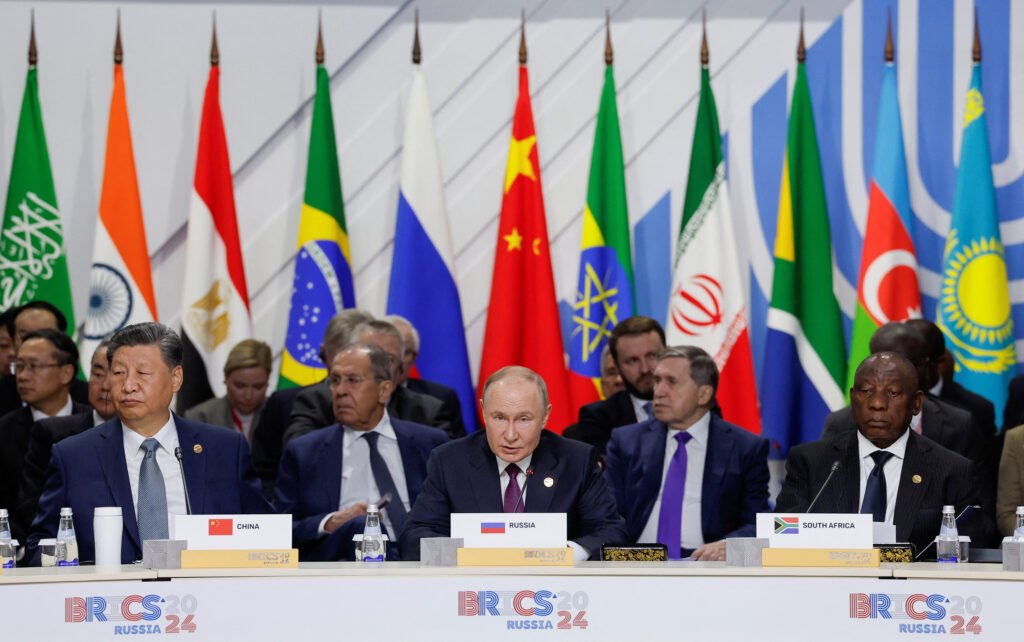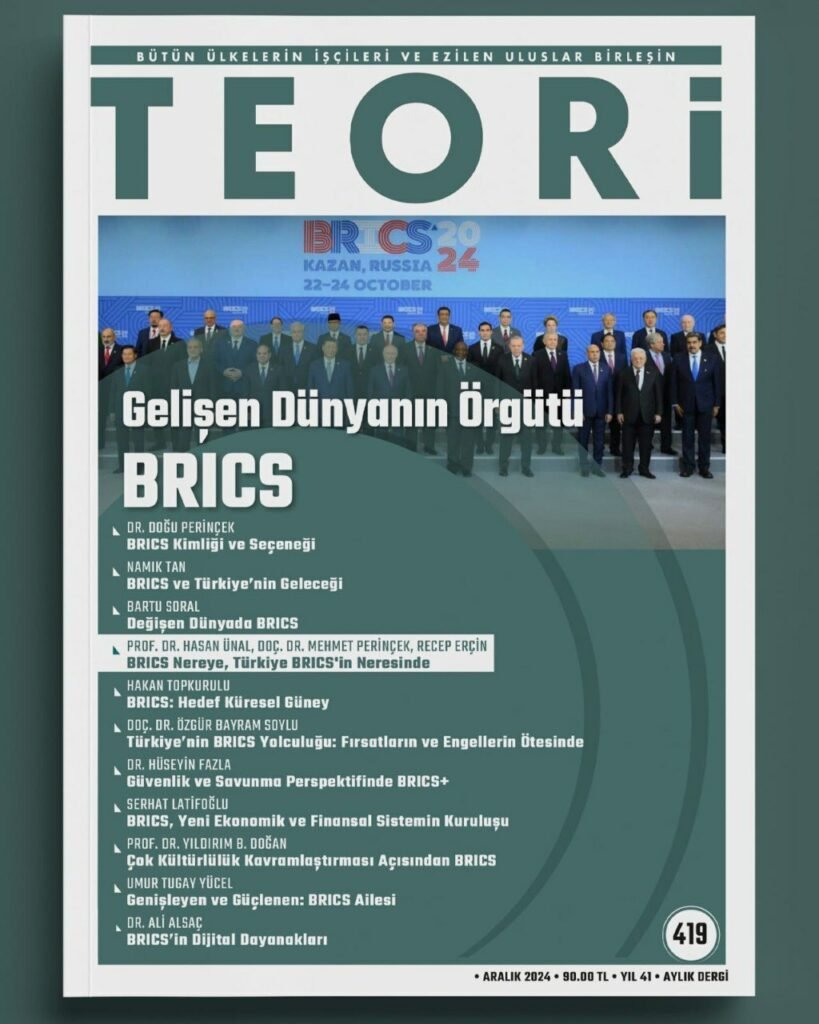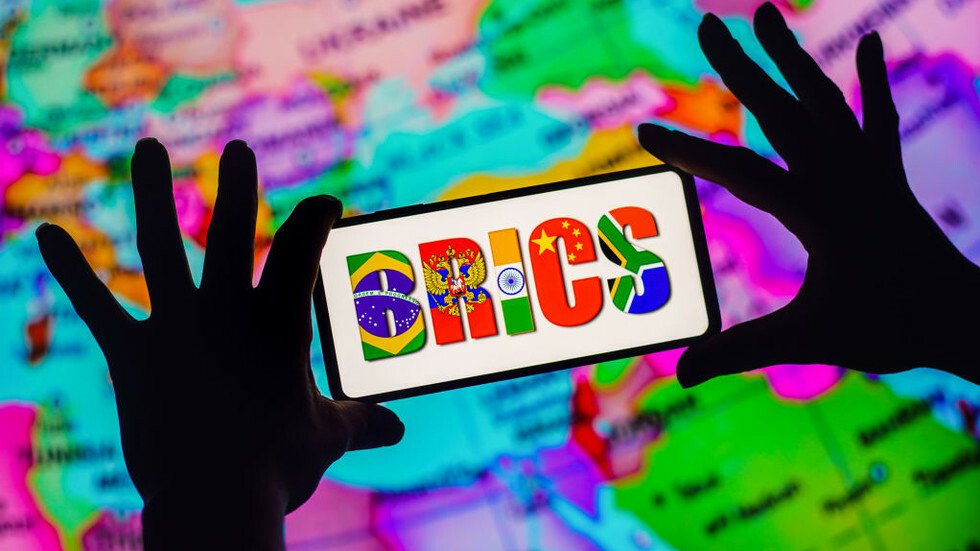Jim O’Neill first introduced the BRIC concept in 2001. O’Neill undoubtedly did not create this concept out of nothing. The changing international order also provided the foundation for O’Neill’s conceptualization. Brazil, Russia, India, and China are the key actors of the BRIC concept. Leading the New World with their emerging economies, Brazil, Russia, India, and China are the key actors of the BRIC concept.
The 21st century has been and continues to be a stage for the crises of the U.S. hegemonic program. Born as BRIC, and later evolving into BRICS+ with the inclusion of South Africa, Iran, Egypt, Ethiopia, and other countries, the organization of the New World continues to expand. The growing family structure of BRICS+ increasingly reflects its emergence as an alternative to the hegemonic program imposed on the world through the U.S. dollar system.
The latest issue of Teori magazine, published in December, focuses on the identity of BRICS. It examines the economic and military potentials, as well as the social and cultural accumulations of the BRICS countries, through the contributions of experts in their respective fields.
‘In Opposition to Western Imperialism’
The Chairman of the Vatan Party, Dr. Dogu Perincek, analyzes the historical and ideological character of BRICS with his article titled “BRICS Identity and Option” :
‘We look at the countries that later became members of BRICS, and they resemble the original five members. Among the countries knocking on BRICS’ door, no France, Germany, United Kingdom, European Union countries, and NATO countries exist. Although NATO member Turkiye wants to join BRICS, it is treated as a stepchild in NATO and is not accepted into the EU. As seen, BRICS consists of countries aligned in terms of world social-economic, political, and cultural divisions. Objectively, they are on one side. Therefore, BRICS is objectively against Western imperialism.’

‘BRICS is an Economic Power Center’
Development economist and author Bartu Soral explains the economic potential of BRICS countries as follows:
‘Collectively, BRICS countries make up a significant portion of global trade, with each member contributing uniquely to the world economy. China, known as the ‘world’s factory,’ dominates exports of electronics, machinery, and textiles. India is a leader in IT services and pharmaceutical production, providing affordable medicines worldwide. Brazil and Russia are key players in the global food and energy markets. Brazil exports soybeans, beef, and coffee, while Russia supplies oil, natural gas, and wheat. South Africa, on the other hand, supplies the world with valuable minerals like gold and platinum, as well as other essential minerals. Together, BRICS countries are trading partners and economic power centers reshaping global supply chains.’
Teori magazine also posed three questions to experts and academics regarding the institutionalization of BRICS, the role of BRICS in Turkiye’s future, and the future of BRICS—the responses from Prof. Dr. Hasan Unal, Assoc. Prof. Dr. Mehmet Perincek and economist Recep Ercin are also featured in the December issue.
‘BRICS is Creating a Political Power Center’
Prof. Dr. Hasan Unal, who participated in the survey, draws attention to the position of BRICS in terms of international political balances:
‘Undoubtedly, the BRICS countries have already formed a significant economic and even somewhat political power center. This is why many states are applying to join. Particularly, countries that want to break the monopoly of the U.S. Dollar in international trade and those that believe the end of the U.S.-led unipolar world order will bring positive results for them want to come together within BRICS. Therefore, BRICS has already become a power center, and this characteristic is likely to continue increasing.’
‘As BRICS Expands, It Will Also Build a Multipolar World’
Assoc. Prof. Dr. Mehmet Perincek evaluates the institutionalization process of BRICS as follows:
‘BRICS aspires to be one of the key poles of a multipolar world. Developing countries and the oppressed world also share this expectation. This claim brings with it serious responsibilities. Given the organization and aggressiveness of the opposing power, these responsibilities also make the need for serious institutionalization inevitable. The principles we mentioned will lay the foundation for BRICS to build itself. The unipolar world and the programs and attacks of globalists are multifaceted… It is not enough to oppose them; it is crucial to determine what should replace them. You cannot destroy something without building it or oppose something without offering an alternative. Therefore, as BRICS builds itself and institutionalizes, it will also construct the multipolar world.’
‘BRICS: The New Institution of the New World’
Recep Ercin, the General News Coordinator of Dünya newspaper, also discusses the possibility of BRICS transforming into a Western-centric institution in the future:
‘First, it must be stated clearly: BRICS will not become an organization similar to the European Union. Nor will it take the form of an institution like NATO. It is the new institution of the New World. BRICS, a structure based more on economic foundations, where countries come together within a framework of cooperation, will, in my opinion, follow a path of creating economic structures that will enable the joint development of member countries.

‘BRICS: An Alternative to the Dollar System’
Hakan Topkurulu, Head of the Economic Policies Bureau of the Vatan Party, focuses on an alternative solution developed within the framework of BRICS against dollar hegemony:
‘Any form of stability is better than instability. This way, the bandit-like system continues because no counter-system or stability center has emerged to challenge it, either by force or through an alternative. While the U.S. experienced world dominance, first with two superpowers and later as a sole global hegemon, developments emerged to create alternatives to this dominance. At the forefront of these is the option represented by the People’s Republic of China, which poses the most serious economic threat to the U.S. dollar system today.’
‘Turkiye’s BRICS Journey’
Assoc. Prof. Dr. Ozgur Bayram Soylu highlights the economic cooperation between Turkiye and the BRICS countries and evaluates the opportunities BRICS offers to Turkiye:
‘The cooperation between Turkiye and the BRICS countries holds great potential for supporting economic diversification, regional development, and technological progress. The increasing global influence of BRICS countries, combined with Turkiye’s strategic geographical position, allows the parties to develop closer cooperation based on common interests.’
In the December issue of Teori magazine, titled ‘The Organization of the Emerging World: BRICS,’ BRICS is examined from all angles. The character of BRICS and the opportunities it offers to the world and Turkey, particularly its economic potential, are at the heart of the issue. Dr. Huseyin Fazla focuses on the military potential of BRICS countries, while Serhat Latifoğlu examines the current financial structure of BRICS. Umur Tugay Yucel explores the expanding and strengthening structure of BRICS members in the issue.

This article is retrieved from the Teori Journal`s December Issue.
For more information, please visit the official website.





